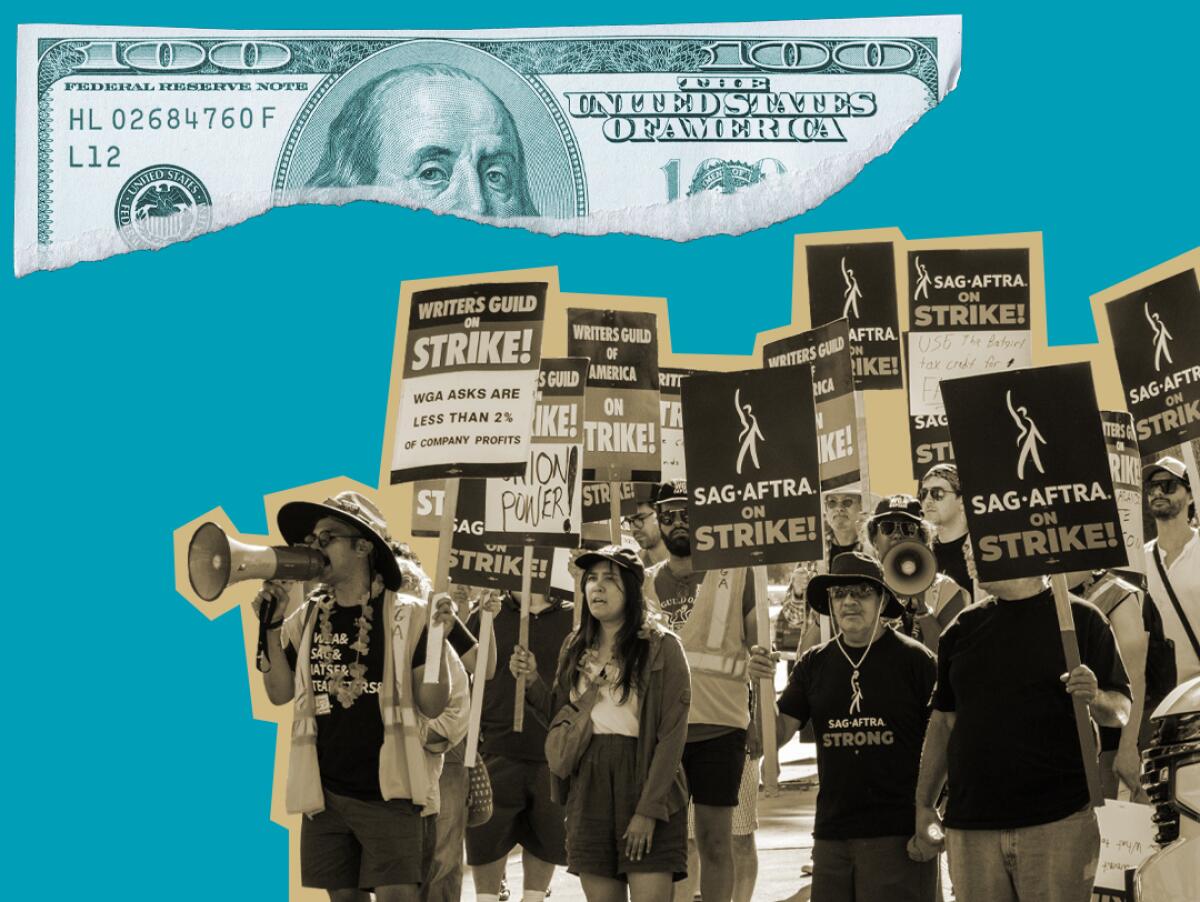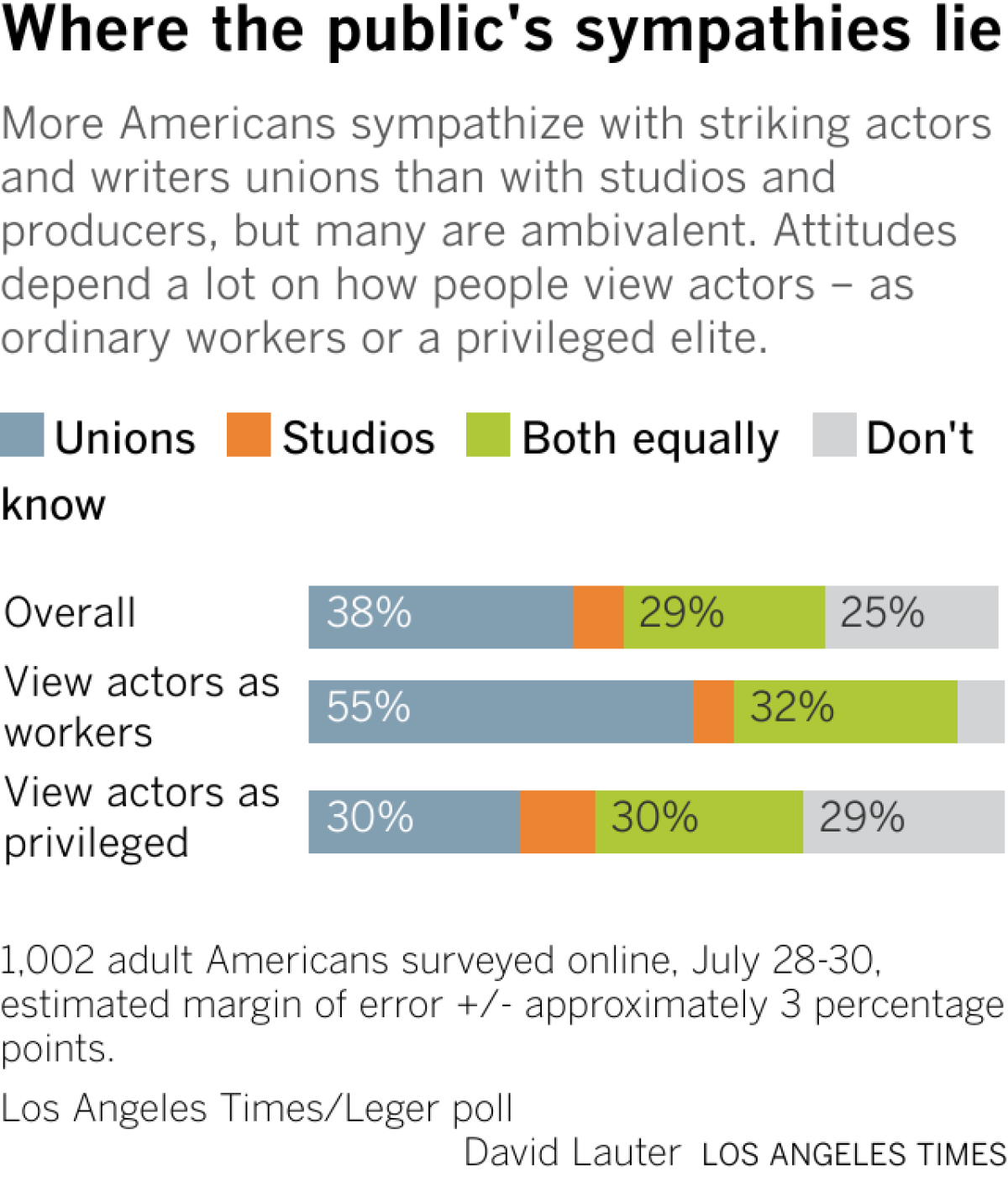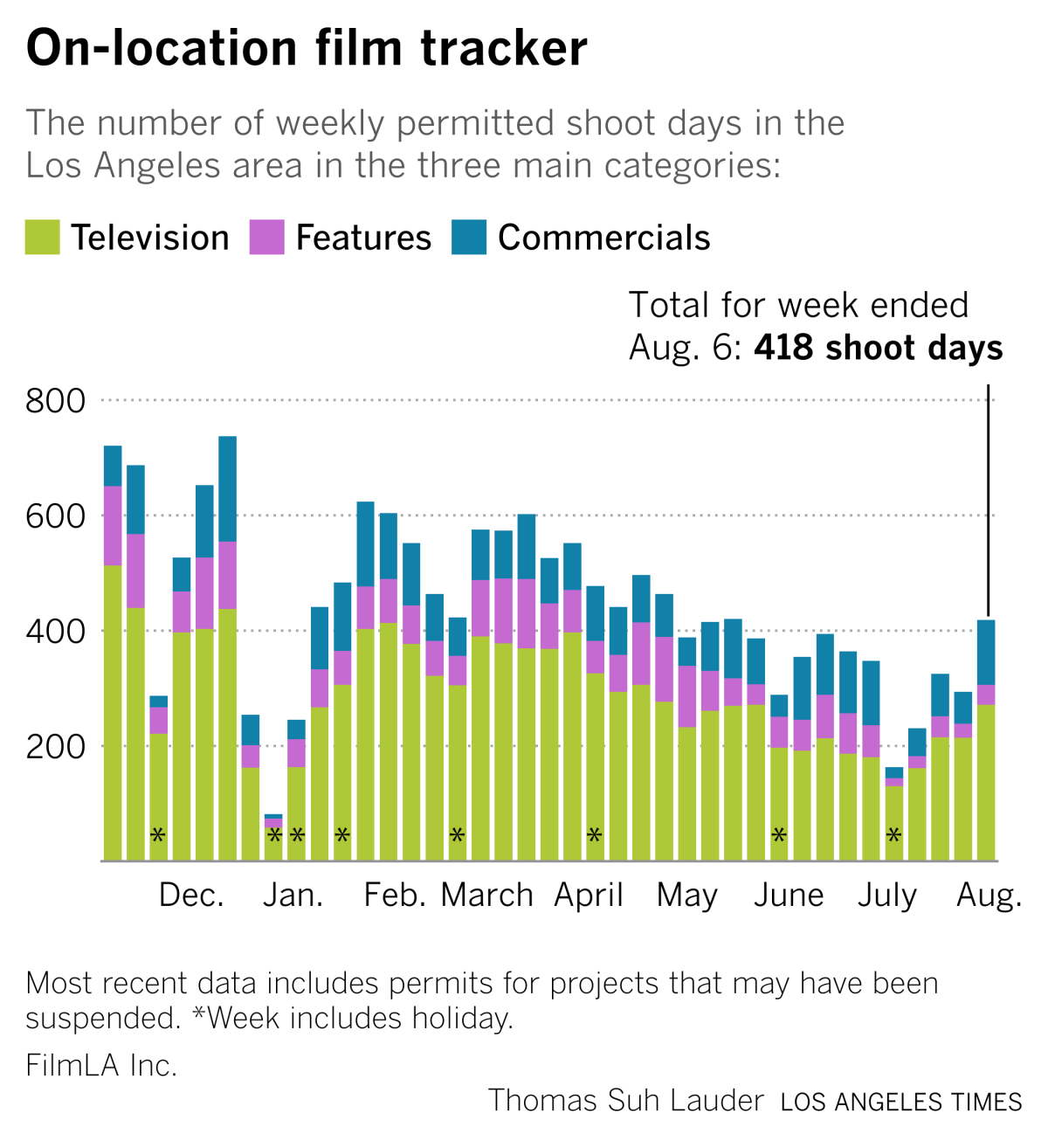Yes, the strike is saving Hollywood studios money. But the downsides are more important

- Share via
Welcome to the Wide Shot, a newsletter about the business of entertainment. Sign up here to get it in your inbox.
One narrative that gets bandied around a lot during the writers’ and actors’ strikes in Hollywood is that the dual work stoppage is a gift to the major studios because they’re able to save money on production at a time when investors are demanding bigger profits after a period of rampant overspending.
While it’s true that studios are saving money, the reality is much more complicated.
Warner Bros. Discovery last week said that halting production of scripted content at the company led to a savings in the “low $100-million range” during the second quarter.
That sounds like a lot, though not compared with the media giant’s $47.8 billion in debt or its $1.7 billion in free cash flow. Netflix increased its full-year cash flow estimate to $5 billion, up by $1.5 billion. Similarly, Paramount Global expects “significantly” increased cash flow during the second half of the year.
But any upside will evaporate as quickly as water on the pavement outside the Universal lot.
The companies’ content engines will ramp up after the WGA and SAG-AFTRA reach deals with the studios and go back to work. That’s exactly what happened after the COVID-19 pandemic shut down everything from movie sets to live sports. Productions came back. So did spending.
“Of course, there’s the short-term benefit from the strike that the media companies will recognize higher free cash flow as production is shut down,” said Robert Fishman, a media analyst with the research firm MoffettNathanson. “But the sustainability of that is really short-sighted. It’s not something that will benefit them in the long term.”
In fact, it’s more likely that a prolonged strike will do long-lasting damage, particularly for legacy studios that are facing dramatic challenges to their businesses, including cord-cutting, declining TV ratings and an improving but still risky box office environment.
With a fall broadcast lineup dominated by reality TV, there’s little left to entice viewers to keep their cable and satellite bundles for anything other than sports. To blunt the impact, CBS, for example, is hosting the broadcast debut of sister channel Paramount Network’s hit “Yellowstone,” starting with Season 1. Television advertising is already soft, and may get worse.
The success of Warner Bros.’ “Barbie” ($1 billion in global box office) and Universal Pictures’ “Oppenheimer” ($553 million) just shows why it’s essential to have original material in the hopper. Not to mention “Teenage Mutant Ninja Turtles: Mutant Mayhem” — a franchise-revitalizing hit for Paramount Pictures — and smaller successes like A24’s “Talk to Me.” Studios can’t go a year without new movies and TV shows.
The pure streamers and tech titans — Netflix, Apple and Amazon — might hold up a little better than the traditional studios for a period of time. But it’s never a good thing for movie and TV studios to not make movies and TV shows. While the streaming services have oldies like “Suits” (currently a top hit on Netflix) to keep folks entertained, the companies need fresh material to prevent subscriber churn, especially as they raise prices to boost revenues.
There’s a reason why Warner Bros. Discovery Chief Executive David Zaslav isn’t playing up the savings for Wall Street analysts, who normally salivate over that kind of thing; and why Netflix’s co-CEO Ted Sarandos is talking about his dad, who was a union electrician, on an earnings presentation. They need the conflict resolved.
There’s also a political dimension to this. It doesn’t look good to brag about all the money you’re saving on content while the writers and actors tell reporters about their inability to eke out a middle-class livelihood.
Public opinion is against the studios as it is, according to polling conducted for The Times by Leger, a Canadian-based polling firm with experience in U.S. surveys.
While sympathy for the unions falls short of a majority, few respondents said they’re aligned with the studios. Thirty-eight percent of respondents said they sympathize more with the striking actors and writers, while just 7% sympathize more with the entertainment and media corporations represented by the Alliance of Motion Picture and Television Producers.

That matters. While the public doesn’t vote on the outcome of the labor negotiations, it would be hard to find a prominent studio executive who doesn’t care about his or her public image.
So why no real movement?
Friday’s much-anticipated summit between WGA and AMPTP negotiators — to talk about restarting discussions — went nowhere, as expected, giving little reason for hope that the strikes will end anytime soon. Warner Bros. Discovery said it has modeled its figures on the assumption that the strikes end in September, but that seems optimistic, to say the least.
The simplest explanation for the impasse is not that there’s a benefit to staying on the sidelines. It’s that the sides are dug in on points about which they fundamentally disagree, including writers’ demands for minimum staffing requirements and higher pay based on the success of streaming shows.
Workers and studios are ultimately fighting over slices of what most analysts expect will be a smaller pie after the business’ transition to a direct-to-consumer model from a highly profitable one based on bundles and box office. That’s a recipe for a long standoff, which helps no one.
Highlights from our poll on the strikes
— More Americans support striking actors and writers than studios.
— Actors and writers aren’t the only ones worried about AI.
— Sharp partisan divide over sympathy with striking writers and actors.
Stuff we wrote
— Hollywood actors on strike, but many A-list celebrities still working. Inside side deals debate. SAG-AFTRA approved side agreements allowing more than 100 independent film projects and series to move forward amid the strike, but the deals have spurred debate.
— As actors and writers push back on automation, Hollywood is in the midst of an AI hiring boom. Amid a pair of Hollywood strikes that have found screenwriters and actors questioning the rise of artificial intelligence, studios and streaming companies are bulking up on AI staff.
— Paramount is selling storied publisher Simon & Schuster to KKR for $1.62 billion. The deal comes months after a sale to Penguin Random House was blocked by a federal judge.
— South Korean actors in Netflix originals want better pay. The company refuses to meet with their union. Netflix has provided immense opportunity for South Korean actors — but just for those at the top. The company declines to meet with the actors’ union.
— Manslaughter case for ‘Rust’ movie armorer heads to trial. Hannah Gutierrez Reed, the armorer for the Alec Baldwin western movie “Rust,” waived her right to a preliminary hearing, sending the case to trial.
— Ava DuVernay teams up with Brian Grazer and Ron Howard to create massive hiring network. Two years ago, DuVernay launched a database to bridge the hiring gap for underrepresented crew. Now it’s being acquired by Howard’s and Grazer’s online network, Impact.
— ICYMI. Marvel Studios VFX workers move to unionize. WWE’s Vince McMahon subpoenaed. Hasbro sells EOne TV studio to Lions Gate. Former ‘Shark Tank’ contestant sentenced to prison.
Number of the week

“Barbie” reaching $1 billion in 17 days is a remarkable accomplishment for Greta Gerwig and Warner Bros., not to mention a boost of confidence for the movie theater industry.
But I’m also interested in the staying power of “Elemental,” which survived its weak opening weekend and has grossed more than $400 million, globally, including $148 million in the U.S. and Canada.
After its debut of $29.6 million, this looked like it was going to be a disaster for Pixar, coming on the heels of “Lightyear’s” dismal performance. Analysts thought “Elemental” would top out at around $120 million, domestically. Instead, it’s ended up with a multiple of five times its opening.
With a budget of $200 million, this doesn’t make “Elemental” a blockbuster by Disney standards, but it does mean it won’t be the big money-loser that was initially feared. It’s another signal that a well-received film can still do solid business after stumbling out of the gate, particularly with family audiences.
On the flip side, Disney’s “Haunted Mansion” continued to struggle in its second frame, dropping 63% for a three-day total of $9 million. With an estimated budget of at least $150 million and a worldwide box office tally of $60 million, this release is vanishing fast.
Best of the web
— ‘There’s no shows being shot.’ A night of strike woes and drinks at industry bar Residuals. (L.A. Times)
— Movie theater patron behavior has been absolute garbage. (Wall Street Journal)
— The startling intimacy of Taylor Swift’s Eras tour. (The New Yorker)
— A showrunner’s memo on the “death spiral of Hollywood monopolies.” (The Ankler)
Film shoots
Here’s the latest data from FilmLA:

Finally ...
The Los Angeles Times’ music team has published an outstanding compendium of pieces commemorating 50 years of hip-hop. Please check out this timeline and the other stories that make up this ambitious project.
Lastly, this is one for me ... The great rock band the Replacements are putting out a box set of their classic 1985 album, “Tim.” I’m not a big “deluxe edition” guy, but I’ll take any excuse to put on “Left of the Dial.”
The Wide Shot is going to Sundance!
We’re sending daily dispatches from Park City throughout the festival’s first weekend. Sign up here for all things Sundance, plus a regular diet of news, analysis and insights on the business of Hollywood, from streaming wars to production.
You may occasionally receive promotional content from the Los Angeles Times.




